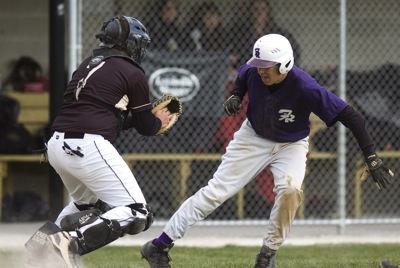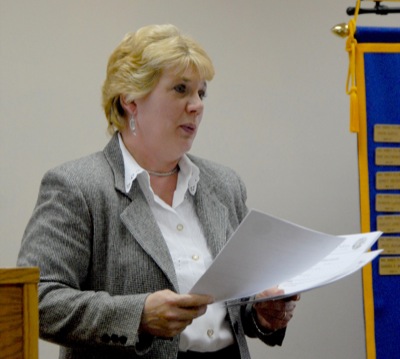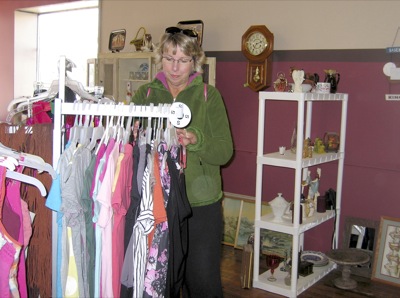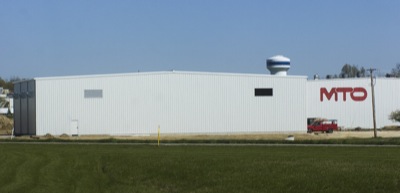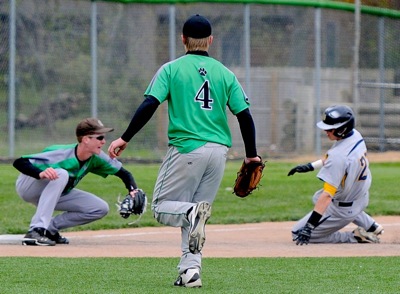Wednesday, April 11th, 2012
Fruit growers on alert
By Nancy Allen
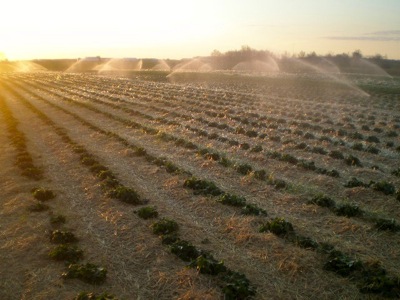
Submitted Photo
Jutte's Fruit Farm uses a sprinkler irrigation frost protection system that mists plants with water. Ice forms and protects the plant from the chilly air while trapping the plant's heat.
Local fruit growers aren't sleeping well.
Blame Mother Nature.
Oscar Jutte, owner of Jutte's Fruit Farm near Fort Recovery, has an alarm by his bedside that awakens him when the temperature reaches 32 degrees. He then heads out to the fields to begin frost protecting his plants.
"This past Friday was the worst so far," Jutte said. "We had to frost protect at 9 p.m. that night until 7:30 a.m. the next morning."
The temperature on the ground got as low as 17 degrees, he said. Since March 27, he's had to frost protect his four acres of strawberry plants five times.
Jutte's system sprays water onto the plants, causing it to freeze and insulate them. The process lets plants withstand temperatures as low as 15 degrees.
So far, his plants have sustained no damage, Jutte said. About 25 percent of the crop is blooming already, making them the most susceptible to damage from the cold.
This year's early warm weather put the plants a month ahead of schedule.
"We don't usually start frost protecting until late April when the blossoms start to come out," Jutte said. "It looks like we could have ripe strawberries around May 10."
Normally, the red berries are ready the first week of June.
Jerry Tangeman has no frost protection for his 500-apple tree orchard near Maria Stein. He's saying a prayer and hoping Mother Nature cooperates.
"Some blooms that were already open froze last Friday, but not all," he said. "About 10 percent was lost just in the lower areas of the orchard."
Tangeman said small apples already growing on some of his trees may have a few frost marks, harmless blemishes that do not affect the taste of the apples. The apples are more protected from cold than blossoms, he said.
"The ones with apples on them don't usually freeze until 26 degrees," he said.
Tangeman said he has many trees with blossoms that have not yet opened. If those get nipped by the frost, that could be bad.
"Once the blossom is froze, you're not going to get an apple there," he said.
Like Jutte's strawberries, Tangeman said his apples also developed earlier due to early warm temperatures this year.
"If we get through tonight and tomorrow, I think we're going to be good for a while," he said.
Dale Kaiser, who raises apples, peaches and raspberries on his fruit farm near Fort Recovery, said some of his apples received minor damage after Friday's frost. His peach trees are past bloom with the fruit developing, which has made them more resistant to frost.
"So far, we've kinda dodged the bullet," Kaiser said this morning. "We had some blackberries planted in a low lying area where the air doesn't move out that got nipped a bit, but not bad."
Kaiser said he uses a tractor to spray calcium enriched water onto his trees to lower the temperature at which water freezes on them to protect from frost.
"It's a very minimal protection tool, but it helps some if you're really on the (temperature) border," he said. "We were ready to mist last night, but the temperature didn't get low enough."
OSU Extension horticulture specialist Brad Bergefurd said the early plant development this year has left many fruit and vegetable growers statewide considering contingency plans to protect their plants from frost.
"One really cold night could do many growers in," he said. "A lot of our fruit growers aren't sleeping well and are a little edgy until we get through April and through the bloom period."
The state's fruit and nut crops were valued at $64.5 million in 2010, the most recent data available. Ohio's apple crop alone was valued at $26.5 million, strawberries at $9.5 million and peaches at $9.4 million.
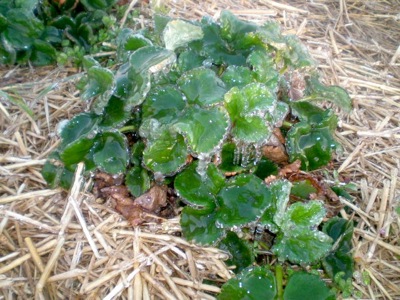
Submitted Photo
Ice coats a strawberry plant at Jutte's Fruit Farm near Fort Recovery.

